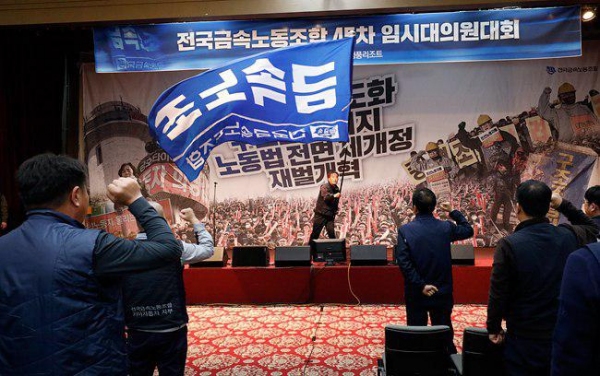
The Korean Metal Workers Union(KMWU) decided to create an industrial wage system in order to reduce the widening wage gap between the workers in the manufacturing sector. The discussion heading toward during its extraordinary congress on March 12 was the solidarity wage in favor of low wage workers. With the wage raise of big company workers slowed down, more compensations will be arranged to benefit the workers of small-sized companies. In order to do so, employers are encouraged to participate in the joint labor management committee at the industrial level. KMWU intended that the manufacturing sector initiates the move to alleviate the social polarization and to activate the industry-based negotiation as well.
Out of unionized workplaces which are member companies of the Korea Metal Industry Employers Association(KMIEA), 67 companies are currently participating in the industry-based collective bargaining with KMWU, which reaches only 1/5 of the total. KMWU is demanding those companies not participating in the industry-based collective bargaining to join the joint labor-management committee.
A related union officer said that "Even though company-based collective bargaining or diagonal collective bargaining has taken place at the workplaces not affiliated with KMIEA, if the companies do not join the joint labor-management committee, KMWU will not endorse the outcome of the collective bargaining agreement." "It means that without participating in the joint labor-management committee, no collective agreement will be made," he clarified.
KMWU plans to form the joint labor-management committee around October this year when collective bargaining processes will almost come to the conclusion. The industrial wage system will be based on the principle of 'equal wage for the equal value of work' and remove the wage gap caused by the size of companies and the types of employment. The wage gap will be reduced by the solution that low wage workers will get higher rate of wage increase, whereas lower wage hike rate will be applied to higher wage workers, what is called solidarity wage.
Workers of the finished car companies like Hyundai Motor, Kia Motors and GM Korea will belong to Group 1 of high wage workers, and the rest will be in Group 2 of low wage workers. KMWU will demand 5.3% wage hike for Group 1 workers and 7.4% for Group 2 workers in the dualised wage negotiations.
reported by Yang Ou-ram
translated by Kim Sung-jin

